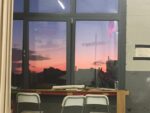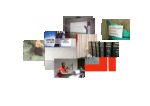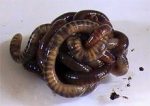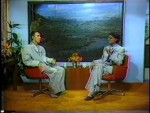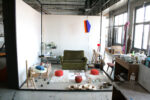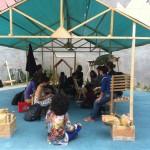This text was written for the magazine of the Steirischer Herbst Festival (Austria). Although the text addresses the specific spatial situation of PAF (Performing Arts Forum) in Reims (a place where a.pass goes at least once per block for a week during End Week), the thinking and writing process around this text was largely constructed around the notions of space as developed in the series of Settlement workshops that were created by current APC Vladimir Miller, and that greatly influenced the notions of ‘performative space’ and scenography as they are developed in a.pass.
SPACES AS TOOLS
One lonely dancer lies meditating on the grass, a challenging philosophical treatise opened on page 213 next to him. From the open windows of the nearby room the sound of a theatre rehearsal, eerily repetitive, its harshness clashing with the idyllic surroundings. The peacocks look through the window of the corner studio at a yoga session. A group of American runaway brides (with fitting gowns) returns from a work session in the nearby woods, their conversations incomprehensible to the uninitiated onlooker. And in every corridor, every time you enter the kitchen, two or more people are discussing politics, the arts, food, practicalities, planning parties, the evening film program, or inviting the others to their showings or work. Not the most typical PAF-day maybe, but surely a possible one.
PAF stands for Performing Arts Forum: a former convent reoriented towards artists, actionists and thinkers in the French Champagne. The 6400 sq feet building was bought by the Dutch theatre maker Jan Ritsema in 2007 (2008?), and has since then functioned as an open space for artists and theoreticians from over the whole world. On its website, the place introduces itself as:
- a forum for producing knowledge in critical exchange and ongoing discursive practice
- a place for temporary autonomy and full concentration on work
- a tool-machine where one can work on developing methods, tools and procedures, not necessarily driven toward a product
- a place for experimenting with other than known modes of production and organization of work, e.g. open source production.
1. The malaise of a generation
In a way this description echoes the concerns of artists in the performing and other scenes of the last ten years and more. The artistic scene has little by little found itself squeezed between governmental compartmentation (through often ill-fitting and politically motivated subsidy systems) and the seductive call of the enterprise-funded 'creative industries', paving the way for an understanding of the artist as either a well-prepared and policy-aware dossier-writer, or a self-proclaimed entrepreneur totally in line with the neo-liberal ethics of self-realization, mobility and economic common sense.
Trying to go against the grain of the times, countless artists have expressed the need and the urgency to escape these corsets of survival by pointing out their toxic by-products: the subsidy system in the well-founded European scene has started to create a way of working and an aesthetics that is not primarily based on artistic choice and necessity, but on the possibilities of touring (and reaching your minimum quota of presentations), networking (getting as much prominent arts centres to back up your project), and formatting (ideally a performance should fit as many venues as possible, not be too costly, and be adaptable to the regular programming strategies of the field). The kind of work that escapes these constraints is often overlooked or doesn't find its way into the regular programmation.
In that sense the self-organized artist model, which depends largely on grants , sponsoring or cooperation with commercial institutions and enterprises might seem a less hypocritical choice for some. And it is true that some company grant systems (Cartier, Siemens, …) have in the last decades built themselves a reputation on supporting often experimental and challenging artists, without posing banal economic constraints on their output. But even in these 'ideal' circumstances, for a lot of artists this kind of recuperation of the artist's position, equalling it to the position of any middle-of-the-road creative worker for any progressive neo-liberal company, does seem to deprive him of any credible critical bite.
Now, it is not the case that in the time span of the last twenty years nothing has been done to accommodate this malaise in the arts. The (European) subsidiary system for example, has invested a lot of resources in the creation of residency spaces, laboratory situations, exchange programs and learning environments that should fill the gap between the artist's needs and the governmental policies. On a large scale, networking and exchange between artists from different countries has been promoted, festivals have echoed the concerns of the neo-liberalisation of the arts, economy and ecology have entered the arts debates, etc… But in the end, the last word was and is still given to the subsidizer: the one who pays decides. And however close the bureaucratized commissions, jury's, cabinets and programmers might come to an understanding of the arts, their strategies and ideologies will always be primarily oriented towards the survival and sustainability of the institution, on the uni-formization of the field (to make it more efficient and manageable), and on the transparent and seductive promo-talk demanded by the communication departments.
And, even more importantly, the artistic sector these last years has been cringing under the hot breath of the increasingly right-oriented politics. Recently, in the Netherlands, the funding for the experimental performance sector got all but eliminated. Portugal since one year no longer has a Minister of Culture. France is giving reign to a neo-conservative arts ideology and so forth. Not even speaking about the countless countries in the East that have no budget for the experimental arts scene whatsoever.
2. Artistic self-organization as a way out of the impasse
In answer to the above-mentioned reserves, artists everywhere in the world have been working on creating alternative models and frames for the development of their own work. An endeavor that has been tinged by the pull from both the comfort of the subsidized scene, and the self-promoting grandeur of the self-made artist.
On the one hand for a lot of artists it is hard to survive out of the subsidiary system. Moreover, their dependent statute is often even structurally enhanced by the dole regulation, favoring the artist's special needs by equalling his practice to a gilded form of unemployment. Artists in the well-to-do-countries of today have grown up with the promise of employment, however badly paid. In Belgium, whole weeks are organized under the title First Aid for artist, in which the statute of the beginning artist on the market is discussed. The concern is how to get all these aspiring young creatives working in a field that seems to be overproducing already. Much like the Swiss cows whose milk production largely surpasses the European needs, artists seem to be kept (barely) alive for the wrong reasons. Where the cows are necessary props in the creation of the 'typical' Swiss mountain landscape, the artists kind of function as a band aid for the total lack of political resistance and discussion that rules the current political era.
So artists have been residency-hopping and networking and realizing themselves like the projects they are, no longer only to sell their goods, but to attain the necessary visibility that will get them invited in think tanks, experimental set-ups and laboratories all over, the one even more critical than the other. However productive these environments might have proved to be, most of these projects come with a price: the working spaces are institutionally tagged, have a limit of validation, have to answer to certain expectations and norms. Just like any other sector in society, the arts have to prove their in- and outcomes, their future visions, their unique selling position, and the originality of their discourse. Not unreasonably, if you follow the logic of the subsidizer. From an artist's point of view, however, these discussion groups and projects often don't reach their goal: for economic reasons the time of working is often too short, or not completely answering the needs of those present. Nor do they feel the need to comply to the desire for the clear profile marketing of the institution inviting them.
Also, as makers, artists have expressed the need to think of other production systems than the 'typical' career model proposed to the artists in the 1980's. The model of the sole author-artist, inventing his or her own esthetics, has been replaced by a much more critical and historically anchored view on how these artists themselves very quickly become commodities in a system that is in constant search for the 'new'. Artists have started to look for other ways of being together, of producing 'symbolic capital', of developing discourse, that can not so easily be recuperated and branded by the artistic economy. Mixing up recognizable solo identities, artists have been working under collective names, often changing the belonging to the 'group' underway, or working on ongoing researches involving very different participants at every stage. What they put into question is not so much the value of the artistic gesture, but the ownership over the material, the ideas, the producing and creation of the artistic material. Whereas in the practice of the Artist (I represent the model of the sole self-created artist from here on simply by adding the capital A) was largely concerned with the unicity of his production, creating his value on the artist market on the basis of scarcity, newness and shock-value, the artists we talk about in this text are rather concerned with the practices of sharing, of questioning themselves as the centre of gravity, of relating to other (historical, political, economic, discourse) realities. In these contexts, the practice becomes as important as the outcome, the way of organizing the work as important as the work itself, the way of dealing with collaborators a significant part of the trajectory leading up (or not) to a public moment.
But for this to become a viable artistic practice, another kind of spaces has to be created: spaces that are no longer governed by subsidy policies or economic (un)common sense, but by artists themselves. Places that are not under the reign of profiling and networking, not dubbed as subsidiary placeholders for artistic merit, but simply places to work, that take into account the simple but pressing needs of the artists and thinkers concerned.
3. Spaces as tools
It is important at this point to focus a bit more closely on this need for sharing, for flexible collaboration, that seems to encompass a lot of artist's projects in the last decades. In a lot of the PAF discussions over the years, these notions have been put into question: what is the common ground explored here? What is to be shared and in what form? What is the underlying logic of the space? etc…
Since I just spent three weeks in a space called 'The Settlement', created by artist Vladimir Miller, let us just elaborate a little bit on these notions. As mentioned in the website description of PAF describing itself as a tool, The Settlement as well functioned not so much as a metaphoric space mirroring society, nor as an artistic project to be realized through collaboration, but simply as a 'protospace': an open space filled with non-functional materials, used as a workspace by an unlimited group of people during three weeks time. The participants of this group could rearrange the materials to their own content, and adapt the space every day to the needs of their personal projects. What resulted out of this way of working was a space in constant transition. Momentary moments of clarity, of crystallization of function or meaning (a heap of wooden crates and metal rectangles becoming a recognizable 'desk', three isolation sheets used repeatedly as 'cinema') dissolved into new constructions over the days, charging the space with ever-changing points of focus of attention and activity. What was shared in this settlement was thus not an idea of a theme or a goal, nor a drive for the creation of spaces for 'sociality', but simply the need to work and be of everyone of the participants. In other words, instead of a group of people gathering around a project and a shared belief about what this project could be or lead to, their only stronghod was an idea of 'commonality': a 'mentality of being together', always on the verge of crystallizing into a temporary self-understood community, but always as well dissolving before this point of a shared understanding and identity was achieved.
If we try to distinguish the community from the communality, I would propose for this text to talk about 'community' as a group that is bounded to a shared value system on the grounds of a recognizable ideology or idea system on which the members of the community agree (or choose to disagree). A community in that sense is based on an initial agreement, however flimsy, and with that agreement comes the appropriation of the individual's contributions, placing them under the banner of a shared territory. In that sense the community is settled, no longer in motion, but as any closed system, in constant dialogue with the outside world.
(Now, we are talking about an abstract understanding of 'community', since on an individual level, we know we nowadays live under the banner of (often a lot) of very different communities, often in flagrant contradiction to each other on the level of ethics, esthetics and politics. This is exactly what makes agency and decision-making, in and out of the artistic sector, such a difficult endeavor today. But this is another discussion).
In contrast and in accordance to this understanding of 'community' I would like to place the sense of 'commonality'. Not based on territory (1), commonality has to be understood as a process, as the forming-of-temporary-localities, as a movement on the way to another one. In this context value is not created on the basis of a common belief, but can only be relative to the situation and what is happening in it. Value in this sense can not be recuperated in this temporary zone, it can only be negotiated through the handling of the objects, through the creation of fleeting situations, through the (unspoken) communal debate. Value is, in other words, not dependent on ideological agreement, but can only be understood as 'practice value': whatever enhances the practice and makes it move is valuable for the commonality. Therefore the politics of The Settlement is a politics of circulation, of knowledge and ideas moving from locality to locality, often separated from their original creators, picked up by someone else and left behind again for someone else to find, interpret and restart with.
In relating this experience to PAF, I think the rephrasing of a space as a tool, as a temporary locality for people to move through, work with and reinterpret, is a valid one. Although radically different in scale and scope, The Settlement and PAF have this in common that they undo the strings attached to artist workspaces as they are mostly understood. The building is both an instrument and a project in itself: whatever you get out of it, you somehow give back to the space, charging it with renewed perspectives and ideas. PAF only has three rules that have to be followed by all residents:
1. Don't leave traces
2. Make it possible for others
3. The do-er decides
In other words: all residents somehow share a common understanding of the building as an instrument for the development of their personal practice, but every one of them can develop another perspective on what that means. But at the same time, the building is not a silent partner: it is a resistant object, that carries a lot of traces of former use, not always literally materialized, but certainly abundant in the atmosphere, the kind of discussions that prevail, the working attitude, the library, the books sold etcetera… As a privately owned initiative, PAF does carry the stamp of its owner, the critical attitude induced by his presence and legacy. But its sheer size (50 rooms, 15 working spaces) makes any kind of controlled discourse or practice impossible. The uniqueness of PAF probably lies exactly there: that the size and the potential of it gets picked up simultaneously by very different groups of people, which makes it at the same time ungovernable and inspiring. The diverse uses of time (long-time residents mixing with hazardous weekend hoppers), space (the same studio used for performing, midnight dinners, exorcisms and political discussions), and exchange (everything from the lone wolf to the societal preacher), keep the space from closing up, from becoming a territory with a recognizable and forbidding identity. Although three times a year PAF organizes communal activities (the SummerUniversity, WinterUpdateMeeting and SpringMeeting) for more or less restricted participants, even those gatherings are proposed rather as a space for re-thinking and re-arranging than as moments of 'passing on the candle' to the next generation. Also at these moments, the different temporalities become clear within the unlimited body of potential residents: some struggling with questions that were circulating since years already, others looking for a way forward, thus stretching up the current moment towards past and future. Digging up the remains of former discussions for redigestion while planting new seeds at the dinner table.
(1) The thoughts on territory and locality and the rest of this paragraph are largely based on a conversation with Vladimir Miller in The Settlement
